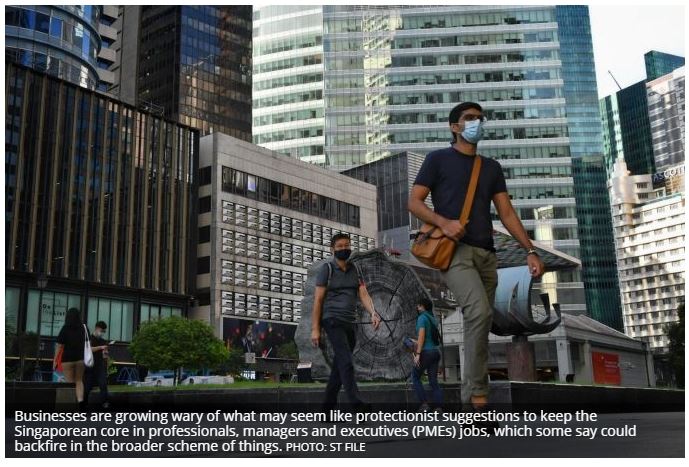Singapore businesses alarmed by growing protectionist calls
BUSINESSES are growing wary of what may seem like protectionist suggestions to keep the Singaporean core in professionals, managers and executives (PMEs) jobs, which some say could backfire in the broader scheme of things.
On Monday, Member of Parliament Patrick Tay called for the minimum qualifying salary for Employment Pass (EP) holders in the infocomm technology (ICT) and professional services sectors to be raised further, similar to the move made for the finance sector last week.
Mr Tay noted that the two sectors generally have more companies on the Fair Consideration Framework (FCF) watch list for potentially discriminatory hiring practices.
But industry players said the suggestion, even if well-intentioned, may penalise firms genuinely facing a shortage of local tech talent and push them offshore.
“To me, it is a situation of cutting off one’s nose to spite the face,” said Christopher Quek, managing partner of Trive, which has invested in some ICT startups.
This is because the ICT sector requires very specialised talent in areas such as AI, cybersecurity and data analytics, Mr Quek said. Singapore’s educational institutions “may not be able to keep up” in churning out the required talent.
It’s also important to distinguish the bad actors, said angel investor Lim Der Shing. In the ICT sector, for instance, discriminatory practices may be more common among manpower outsourcing firms, as opposed to tech companies.
He added: “The tech talent crunch is global and it is already hard to hire even with the status quo. So we must be careful; the last thing we want to happen is to slow down our digitisation drive and budding startup ecosystem success.”
Any changes to EP criteria would need to be accompanied by “comprehensive” efforts for upskilling, said Rohit Jha, CEO of laser communications startup Transcelestial.
To be sure, raising EP salaries may help build local talent for more entry-level, generalist roles, said Adrian Choo, chief executive of Career Agility International. “I’ve seen non-local HR managers hired simply because their bosses are not local. These managers have very generic skills that locals can do,” he said.
However, it will be important that such policies do not disadvantage companies seeking more specialised talent. “It may cause undue stress to companies, especially startups, that require that kind of expertise at a lower cost,” Mr Choo said.
And if push comes to shove, firms may simply hire offshore talent or take the business overseas.
Stefanie Yuen Thio, joint managing partner at TSMP Law Corp, noted: “Covid-19 has shown us that a lot of functions can be done from home. If it becomes too unproductive to hire a Singaporean – either because he is too expensive or isn’t as qualified as a foreigner – a company can use outsourced service providers, such as in India, the Philippines or China.
“After all, if a staff member can do the bookkeeping from their home in Bukit Panjang, why not outsource to someone working from his home in Bangalore in India, or Baguio in the Philippines?”
Business costs aside, the talk about such methods to maintain a Singaporean core also sends a “much more scary message” – in Ms Yuen Thio’s words – to the expatriate workforce: that of Singapore potentially turning protectionist.
This is especially as Mr Tay also suggested that if measures including the EP salary hike bear no fruit, a two-tiered EP quota for higher-skilled and mid-skilled workers could be considered.
The Singapore Business Federation said it would not support such a move. One reason is optics, said its chief, Ho Meng Kit. “The idea of a quota or a limit to the number of PMEs that our economy can admit runs counter to the nature of our economy, which must remain open to trade, investments and important connections to the world.”
Selena Ling, head of treasury research and strategy at OCBC Bank, also said that once hard targets are set, it may give rise to concerns of “reverse discrimination”.
Economist Walter Theseira, an associate professor at the Singapore University of Social Sciences, noted that the government has historically worried about discouraging businesses from choosing to plant themselves in Singapore.
And quotas, especially for high-skilled labour that is short in Singapore and much less substitutable, mean Singapore could lose certain sectors to other countries, he said.
The implementation of a quota system will also inadvertently force policymakers to make difficult decisions as to how the quotas will be allocated to companies and sectors, observers noted.
But at the end of the day, the broader issue is arising due to concerns over the cost of growth to the Singaporean identity, Prof Theseira noted. “Do we really want to have an economy that’s large and vibrant but run by foreigners because we don’t have the skill to do it?
“I don’t think Singapore wants to go down that route, but some Singaporeans fear that we may be going down that route in some sectors.”
Source: https://www.businesstimes.com.sg/government-economy/singapore-businesses-alarmed-by-growing-protectionist-calls


 Thailand
Thailand




